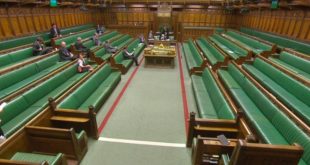Industry strategic consultancy Regulus Partners gives an overview of last week’s Lords Select Committee report, and how casinos may have found a silver lining amid parliamentary rows over research, prevention and treatment of harmful gambling.
UK: Regulation – peer review reveals path to redemption?
This week was a tale of three reports for Britain’s gambling industry as in turn the Advisory Board for Safer Gambling, the House of Commons Public Accounts Committee and the House of Lords Select Committee on Gambling published findings. Viewed through the prism of media sensationalism, it would be easy to view the reports as part of a coordinated anti-gambling movement; but this would be a misreading of both motivation and intent.
The ABSG and House of Lords reports in particular appear to offer two very different visions for the future of the gambling industry and neatly illustrate the choice that lies before licensees and trade bodies.
Of the three, the Public Accounts Committee report is the most targeted and the most measured, restricting itself to the systemic fitness of the regulatory regime. As with the House of Lords report (and last month’s Gambling-related Harm APPG report), it suffers from occasional lapses in factual accuracy (something a simple fact-check would have addressed) but it is a largely technical report examining the institutional fitness to regulate of the Gambling Commission (and to a lesser degree, the Department for Culture, Media and Sport).
The fascinating comparison is between the House of Lords report and the ABSG progress update (Year One of the National Strategy to Reduce Harms). The select committee may have ‘sexed-up’ its findings for the benefit of the media but – sensationalist summary aside – its report is notable for its measured tone and sense of coherence.
In treading familiar territory (advertising, sponsorship, online limits, funding for research, education and treatment etc) it seeks out nuance and (in the main) demonstrates a preference for targeted intervention – selecting the rapier rather than the cosh. Not all of its recommendations are sufficiently considered; but it is clear what problems they are intended to solve (presenting an opportunity for others to develop smarter solutions). At its heart, the committee has mapped out a path to a more sustainable and less politically volatile business environment for ethically-motivated operators.
The ABSG report by contrast was published with very little fanfare but arguably presents a darker and more worrying vision for the future of regulated gambling in Britain. Given the absence of any effective framework for assessing the National Strategy to Reduce Harms, the report largely confines itself to subjective narrative assessments of strengths and weaknesses (an approach that allows it to gloss over the shortcomings of the Gambling Commission and the ABSG while making pejorative comments about “the industry”); and makes a large number of recommendations for things that should happen, without articulating how these things will be made to happen.
It is in the area of evaluation that things start to get interesting. The ABSG is right to call for the establishment of a harm reporting framework – even if it fails to explain why this has taken so long to achieve (it is now two years since Heather Wardle and Gerda Reith published their proposals). The proposed safer gambling league table of operators is more complex but conceptually sound so long as it is used to guide consumers (rather than to ‘name and shame’ businesses as others have suggested) and that it is based upon sensible consumer-focused criteria.
The ABSG report’s emetic conclusion spews forth a bewildering array of Key Performance Indicators and targets, unaccompanied by any real explanation of how they are to be achieved. For example, we are told that the rate of moderate risk and problem gambling amongst adults must be halved (using the 2016 Health Surveys as a baseline) by the end of next year; that gambling-related suicide and suicide ideation must be reduced to zero within the same time frame; and that exposure of children to gambling marketing must be reduced by 50% by the end of this year and eradicated entirely by the end of next. We are not optimistic about the prospects for success.
While these targets may reflect admirable sentiments, they also appear indicative of an almost complete absence of intellectual engagement – possibly the triumph of public health zeal over reason. Where gambling-related suicide is concerned, the ABSG wishes to establish a baseline of gambling-related suicides by the end of this year (despite the fact that there is no mechanism currently in place to collect this data); and then to reduce incidence to zero by the end of next year. This is not simply unrealistic but definitively impossible.
Considered in the light of plans to halve rates of problem gambling, it also implies that by the end of 2021, the risk of suicide amongst people with gambling problems would be lower than for the population at large. ‘Problem gambling’ would in this way become a predictor of zero risk of suicide.
Gambling-related suicide ideation is also to be banned from next year (suggesting perhaps the Orwellian involvement of some kind of Thought Police). Under the heading, ‘actions to deliver’ this outcome the ABSG simply notes ‘DHSC’ – a Government department rather than an action. The Gambling Commission, the Coroner, the (unspecified) ‘banks’ and the Department of Health are apparently on the hook for achieving this goal – a matter that raises some interesting possibilities for litigation.
In setting forth its KPIs, the board cites as inspiration the words of former US Defence Secretary, Robert McNamara: “We must avoid making what is measurable important, and find ways to make the important measurable.” This seems to be a questionable source of wisdom (particularly given the anti-imperial zeitgeist), considering that McNamara institutionalised the use of ‘body counts’ and ‘kill ratios’ in the US military’s conduct of the Vietnam War (in some cases with appalling consequences).
This week has highlighted the fact that Britain’s gambling operators face a choice between a process of cautiously liberal reform and something that might start to look rather a lot like prohibition. The fact that this is not really a choice at all is no guarantee that the industry will take the right path. Almost five years ago, Matthew Hill gave one of his final speeches as a director of the Gambling Commission in which he described the choice then facing licensees:
“It seems to me that there are really two doors out of this room. One door leads to greater constraint; ever tightening legislation and regulation, greater controls on products and their deployment to allay public fears… This is the door that is opened by industry’s failure to act. “The other leads to a somewhat sunnier place. It involves the industry – and its leaders – understanding and taking public concern seriously and responding to it by devising and testing practical measures to reduce harm…if the public concern is recognised and accepted and engaged with, it offers the prospect of sustainable, responsible and respected business. It also offers a much greater prospect of society getting focused properly on what gambling is supposed to be about – which is a safe, enjoyable experience for all those who want to participate.”
It is hard to escape the notion that some operators picked the wrong door back then. This time, the industry as a whole must choose more wisely.
UK: in Parliament – Casinos find silver lining as research row rumbles on
Away from all the hoopla of sponsorship bans and online limits, this was a cautiously positive week for one part of Britain’s gambling industry. Casinos received support from Lord Grade’s select committee for a long overdue review of the success or otherwise of the 2005 Act licensing regime.
This assessment was supposed to have taken place around 2014 but – along with wider plans for periodic legislative review – was lost amidst the birthing pains of the new Act and the ensuing ministerial amnesia. There is no guarantee that the Government will agree to the committee’s proposal or what any such review would conclude; but the fact that some in Parliament have responded to a justifiable grievance represents progress.
Casinos were also the dominant subject of Parliamentary Questions this week as Lord Foster of Bath (LibDem) and Laurence Robertson (Cons, Tewkesbury) submitted seven questions between them regarding the decision to exclude casinos from tomorrow’s re-opening festivities. In another week of damage control for Britain’s licensed industry, this may be only a modestly positive coda. However, it does illustrate the complex nature of gambling in politics, how much nuance is involved (Lord Foster for example is a member of both the Gambling-related Harm APPG and the Lords Select Committee) and that the direction of legislative reform need not be uniformly reductive.
One Parliamentarian who has not emerged well from this week’s events is the PR loving Lord Chadlington. The House of Lords Select Committee (which at one point he had been expected to chair) popped another of the balloons holding aloft his charity, Action Against Gambling Harms (AAGH!), into which he had hoped to shepherd £100m of funding from Britain’s largest licensees.
The Lords devoted nine clauses of their report to ‘the Chadlington Committee’, concluding that “We do not believe that the grant giving charity proposed and set up by Lord Chadlington’s Committee, largely funded by the industry on a voluntary basis, will be seen to be sufficiently independent for its research to be any more trusted than research commissioned by GambleAware.”
The question of industry funding for research, prevention and treatment of harmful gambling was a recurrent topic this week. In an open letter to the Government published in the British Medical Journal, a large number of high profile academic researchers waded in on the £100m tug of war between AAGH! and GambleAware by demanding that neither organisation should be allowed to administer the industry funds.
The BMJ letter seems perhaps a touch opportunistic – effectively using a row over funding for treatment to support an argument about funding for research. Nevertheless, they have a point. GambleAware’s cause meanwhile was not helped by criticism in both the Lords report and the ABSG update. At one point, there might have been an opportunity to have a sensible debate in relation to funding for research, prevention and treatment and the wisdom of the levy. Following a catalogue of mis-steps, it is hard to escape the conclusion that time has now passed.
_______________










